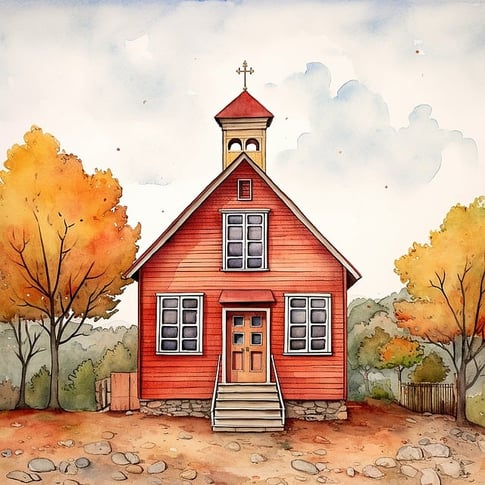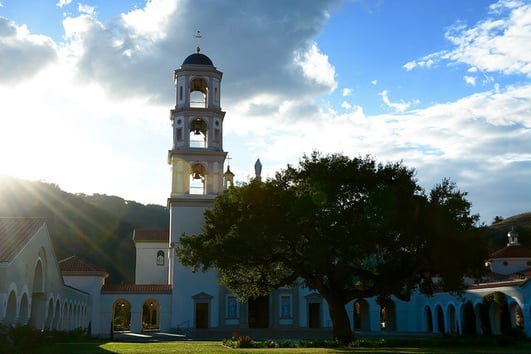
You might be interested in going to a small college, but just how small is “small,” exactly? In general, schools that are considered “small” have fewer than 5,000 students in total. However, quite a few schools are actually less than 1/10 that size!
In this article I’ll describe the characteristics of small colleges and then provide a list of the smallest colleges in the nation by category. That way you can decide if going to a small school really is the right decision for you.
List of the Smallest Colleges in the US
These are the smallest four-year, non-profit colleges in the nation sorted by type and enrollment number. This list includes schools with fewer than 500 students but more than 50 students because colleges with fewer than 50 students are extremely rare and not relevant to enough students to merit inclusion.
All enrollment data is from the National Center for Education Statistics and U.S. Department of Education College Scorecard.
Smallest Arts Colleges
|
College |
Enrollment |
|
Compass College of Film and Media |
74 |
|
VanderCook College of Music |
88 |
|
Curtis Institute of Music |
109 |
|
American College of the Building Arts |
121 |
|
Pennsylvania Academy of the Fine Arts |
121 |
|
American Academy of Art |
145 |
|
Cleveland Institute of Music |
208 |
|
Pennsylvania College of Art and Design |
228 |
|
San Francisco Conservatory of Music |
228 |
|
Art Academy of Cincinnati |
234 |
|
Montserrat College of Art |
336 |
|
Moore College of Art and Design |
357 |
|
Johns Hopkins University—Peabody Conservatory of Music |
375 |
|
Maine College of Art & Design |
380 |
|
Pacific Northwest College of Art |
384 |
|
New England Conservatory of Music |
423 |
|
Cornish College of the Arts |
428 |
|
New York School of Interior Design |
444 |
|
Manhattan School of Music |
489 |
|
Tufts University—School of the Museum of Fine Arts |
494 |
Smallest Religious Colleges
For this list, I’ve focused on colleges that primarily identify as seminaries or Bible colleges. Also, I’ve excluded religious colleges that only train religious professionals because they are too specialized for most people.
|
College |
Enrollment |
|
Yeshivas Be’er Yitzchok |
68 |
|
Beth Hamedrash Shaarei Yosher Institute |
75 |
|
Bais HaMedrash and Mesivta of Baltimore |
81 |
|
Ohr Hameir Theological Seminary |
85 |
|
Yeshiva of the Telshe Alumni |
88 |
|
Yeshivas Emek Hatorah |
98 |
|
Yeshiva Shaarei Torah of Rockland |
102 |
|
Yeshiva Derech Chaim |
110 |
|
Rabbinical College Ohr Yisroel |
114 |
|
Kuyper College |
114 |
|
Talmudical Yeshiva of Philadelphia |
117 |
|
Bais Medrash Toras Chesed |
117 |
|
Sterling College |
126 |
|
Yeshiva Karlin Stolin |
129 |
|
Faith International University |
140 |
|
Rabbinical College of Long Island |
157 |
|
Trinity Bible College and Graduate School |
161 |
|
Simmons College of Kentucky |
163 |
|
Hebrew Theological College |
170 |
|
Women’s Institute of Torah Seminary and College |
189 |
|
Sacred Heart Major Seminary |
190 |
|
Appalachian Bible College |
192 |
|
Yeshiva Gedolah Imrei Yosef D’spinka |
201 |
|
Luther Rice College & Seminary |
203 |
|
Northpoint Bible College |
210 |
|
Grace School of Theology |
212 |
|
Rabbinical College of America |
217 |
|
South Florida Bible College and Theological Seminary |
226 |
|
Yeshiva Toras Chaim |
230 |
|
Baptist Bible College |
236 |
|
Sh’or Yoshuv Rabbinical College |
241 |
|
Ner Israel Rabbinical College |
261 |
|
Faith Baptist Bible College and Theological Seminary |
297 |
|
God’s Bible School and College |
314 |
|
Multnomah University |
336 |
|
Mesivta Torah Vodaath Rabbinical Seminary |
369 |
|
Talmudical Seminary Oholei Torah |
393 |
|
Rabbinical College Bobover Yeshiva Bnei Zion |
407 |
|
Yeshiva of Machzikai Hadas |
411 |
|
Rabbinical Seminary of America |
415 |
|
SUM Bible College and Theological Seminary |
416 |
|
College of Biblical Studies-Houston |
418 |
|
San Diego Christian College |
438 |
|
Talmudical Seminary of Bobov |
473 |
Smallest Engineering, Medical, and Other Professional Colleges
All of these college focus on STEM or other professional education paths.
|
College |
Enrollment |
|
Bastyr University |
75 |
|
St. John’s College of Nursing |
93 |
|
Webb Institute |
105 |
|
Trinity College of Nursing and Health |
108 |
|
Rush University |
118 |
|
Lakeview College of Nursing |
152 |
|
Saint Anthony College of Nursing |
189 |
|
Columbia College |
234 |
|
Northwestern Health Sciences University |
249 |
|
Charles R Drew University of Medicine and Science |
255 |
|
University of Health Sciences and Pharmacy in St. Louis |
255 |
|
Southern California Institute of Architecture |
256 |
|
St. Francis Medical Center College of Nursing |
277 |
|
Boston Architectural College |
290 |
|
Allen College |
314 |
|
Capitol Technology University |
322 |
|
Logan University |
339 |
|
Bellin College |
356 |
|
Franklin W. Olin College of Engineering |
361 |
|
Touro University Worldwide |
425 |
|
Pacific Oaks College |
479 |
Smallest Liberal Arts Colleges
|
College |
Enrollment |
|
American Baptist College |
57 |
|
Divine Word College |
67 |
|
Magdalen College |
67 |
|
Grace Mission University |
68 |
|
Allegheny Wesleyan College |
77 |
|
University of the West |
77 |
|
Heritage Christian University |
83 |
|
Trinity International University-Florida |
83 |
|
Thomas More College of Liberal Arts |
89 |
|
Cleveland University-Kansas City |
91 |
|
Oak Hills Christian College |
94 |
|
Webb Institute |
105 |
|
Antioch College |
133 |
|
Criswell College |
137 |
|
Goddard College |
146 |
|
Davis College |
147 |
|
Johnson University Florida |
149 |
|
Baptist University of the Americas |
156 |
|
Manhattan Christian College |
158 |
|
Great Lakes Christian College |
165 |
|
Lincoln University |
168 |
|
Barclay College |
168 |
|
Ecclesia College |
148 |
|
Martin University |
180 |
|
Beulah Heights University |
181 |
|
Crowley’s Ridge College |
197 |
|
New Saint Andrews College |
198 |
|
Trinity College of Florida |
204 |
|
Bennett College |
207 |
|
University of Saint Katherine |
245 |
|
Paine College |
251 |
|
The Baptist College of Florida |
252 |
|
Welch College |
261 |
|
Bethesda University |
264 |
|
Bacone College |
266 |
|
Bethany Global University |
284 |
|
Randall University |
285 |
|
Lincoln Christian University |
287 |
|
The King’s University |
299 |
|
Allen College |
314 |
|
Naropa University |
317 |
|
Principia College |
318 |
|
Multnomah University |
334 |
|
Trinity Baptist College |
341 |
|
Wells College |
341 |
|
Salem College |
346 |
|
Alaska Pacific University |
347 |
|
Calvary University |
348 |
|
The King’s College |
355 |
|
Bellin College |
356 |
|
College of the Atlantic |
369 |
|
Patrick Henry College |
371 |
|
University of the Southwest |
414 |
|
Urshan College |
442 |
|
Sweet Briar College |
451 |
|
Prescott College |
383 |
|
Paul Quinn College |
384 |
|
North American University |
389 |
|
Finlandia University |
400 |
|
Warner Pacific University |
406 |
|
Stephens College |
409 |
|
Morris College |
410 |
|
Life Pacific University |
419 |
|
Rosemont College |
425 |
|
Beacon College |
431 |
|
Soka University of America |
435 |
|
San Diego Christian College |
438 |
|
Southwestern Christian University |
456 |
|
University of Valley Forge |
473 |
|
Carolina University |
477 |
|
Bethel College-North Newton |
478 |
|
East-West University |
487 |
|
Thomas Aquinas College |
497 |

Why Are These Schools So Small? 3 Big Reasons
It might seem unorthodox for the enrollment of an entire college to be the same size as your high school class (or even smaller!). Though definitely uncommon, these schools usually have a solid rationale for keeping their student bodies so tiny. There are three major reasons these colleges are particularly small
Reason #1: Extremely Specialized Curriculum
Often, small colleges have a very specialized curriculum that caters to a narrow demographic of students. Many of the smallest colleges are religiously affiliated, specialized art schools, or professional schools.
The smallest liberal arts colleges usually have a curriculum that emphasizes unique modes of learning. For example, some of these schools have a “Great Books” curriculum, meaning that all students must read a collection of classic texts as part of the college’s universal academic requirements. If you’re looking for an outside-the-box college experience, then a small school could be a perfect choice for you.
Reason #2: Spin-Offs of Larger Universities
Some of these schools were once part of larger universities and then branched off to form their own communities. Sometimes this happens when a university system shrinks. Smaller schools that were once affiliated with the flagship university have the option to become independently-functioning entities.
This can also happen if a school no longer fits with the larger campus. They may have developed new types of classes, or perhaps they want to serve a different portion of the student population.
Regardless of the reason why, this legacy goes along with small schools’ tendency to be more specialized and attract a much smaller group of prospective students.
Reason #3: Dedication to Personalizing the Academic Experience
Small schools are often committed to restricting class sizes in order to give each student individualized attention. Often, students can design their own curricula and access a level of guidance and support from professors and advisors that’s unheard of at larger institutions. At small universities, students frequently collaborate with professors and are asked to give self-evaluations.
Tiny schools treat the college experience as an evolving dialogue between students, their teachers, and their communities. This enables them to focus less on grades and more on learning as an ongoing interactive process. In fact, some small schools don’t assign course grades at all!

Small colleges tend to be unique…which means that each student will have a unique collegiate experience, too!
What Is the Tiny College Experience Like?
So you can get a sense of what the smallest schools are actually like, I’ve compiled a few student testimonials that provide perspective on the pros and cons of attending these colleges.
Thomas Aquinas College
“They create an academic bubble of seclusion, quite literally.” (Source)
“The rules are a bit extreme, and never think that someone is not watching. At a school this small, everything gets out in the open.” (Source)
“I admit that this school does wonders with the mind. Thomas Aquinas delves into critical thinking and reading beyond the text.” (Source)

Thomas Aquinas College, Santa Paula California (Harold Litwiler/Flickr)
The Manhattan School of Music
“The Manhattan School of Music is an amazing experience. The professors within my major are top notch experts who encourage the growth and individualism of all students.” (Source)
“The professors are world class and the environment is the most welcoming and comfortable that I experienced anywhere.” (Source)
“Everyone is so committed to their craft and I am so grateful to be studying alongside such talented human beings. The Musical Theatre curriculum and staff really show me how much I love this area of study.” (Source)
New York School of Interior Design
“It’s a good school but small. The classes get canceled sometimes because of under-attendance. Tuition is too high!” (Source)
“NYSID offers a lot of opportunities outside of class for students, but they don’t have a better way of connecting with students outside of emails. Focusing a career in interior design, my favorite experiences have happened outside of the classroom, being involved in organizations such as the Contract Club and IIDA Representative. These experiences have proved invaluable in networking and meeting professionals in my field.” (Source)
As you can see from all of these school quotes, the smallest colleges are often limited in their housing and dining options and campus activities.
However, they might be the right fit for students who are interested in a specific academic field or mode of learning. One benefit you can count on is a close bond with professors and other students.
What’s Next?
If you’re just starting your college search, you might not be sure whether a big or small college is the best choice for you. Learn about the major differences between the two.
Another factor to consider in the college search process is location. Do you want to stay close to home or start over somewhere new? Read this article to find out if a college close to home is the right choice for you.
For more advice on how to conduct your college search, read my guide on how to choose the best college for you and my review of the top 10 college search websites.
Want to improve your SAT score by 160 points or your ACT score by 4 points? We’ve written a guide for each test about the top 5 strategies you must be using to have a shot at improving your score. Download it for free now:


source: blog.prepscholar.com